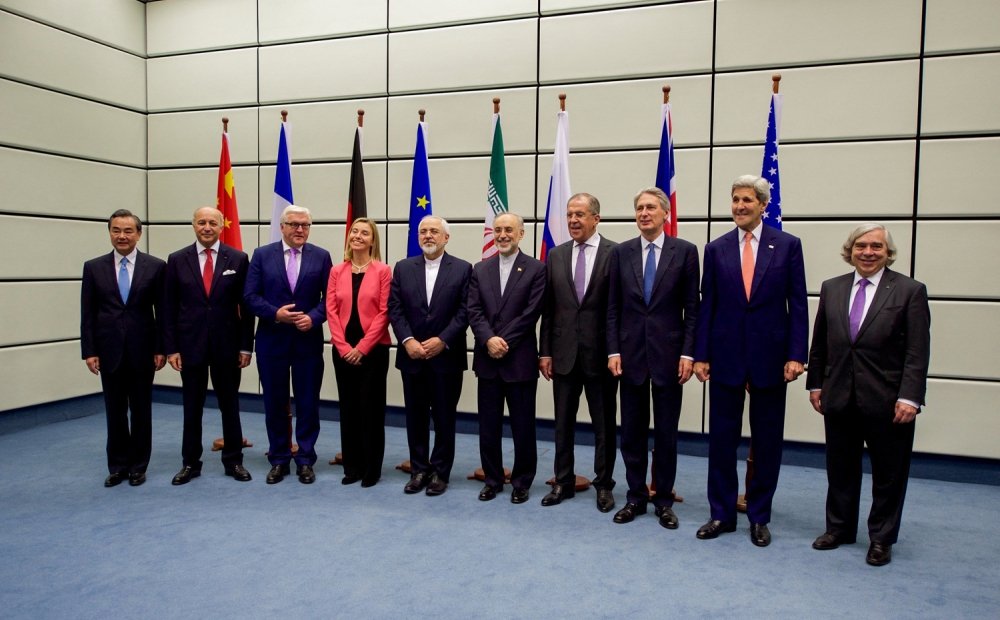Analyzing President Trump’s New Iran Strategy

This week, President Trump is expected to decertify the Iran nuclear deal and lay out a broad, new strategy for dealing with the Islamic Republic. While some have argued that the president has an opportunity to stiffen pressure on Tehran and even renegotiate parts of the nuclear deal, others maintain this is both unrealistic and dangerous – and warn of isolation for the United States and the resumption of Iran’s nuclear program. As the fate of the deal falls into the hands of Congress and the U.S.-Iran relationship enters a critical new phase, the world is watching.
Listen in as three veteran analysts of U.S. policy and the nuclear agreement discuss these and related issues at a critical moment for the region and the U.S.-Iran relationship.
Key Quotes
Jane Harman
“What is Kim Jong-un thinking as he watches this? I think he’s thinking, ‘Why should I talk to the Americans? Why should I agree with them, agree to anything with them, because they’re fickle and they could walk away in a minute if they change the agenda?'”
Colin Kahl
“There is no objective crisis with the deal itself. The crisis is largely one that has been manufactured by the administration in order to put pressure on the international community. The agreement can be expanded and thankfully, because the deal has these long term constraints, we have years to engage in steady, patient diplomacy to either patch up elements of the deal or supplement it.”
“This entire gamble actually focuses on the part of the problem that at least for the next 10 or 15 years is tapped, and that is the nuclear file. And it probably threatens the very consensus that the administration wants to create around Iran’s destabilizing activities in the region. By creating the perception that we’re implementing the deal in bad faith, it’s hard to see how we are going to be taken sufficiently seriously to try to patch up or expand the deal.”
“At a time when we are facing a nuclear crisis in North Korea and we’re trying to get a diplomatic outcome there, this is both a distraction and potentially undermines our credibility to live up to any arms control agreement or de-escalation agreement we might have with North Korea.”
“It’s impossible to believe you’re going to get 150 percent of the current deal with less than 100 percent of the leverage we had prior to the deal.”
“This is a regime that suffered $600 billion of damage during the Iran-Iraq War and almost a million casualties... So they weren’t going to capitulate to a permanent dismantling of their program. Would I like to see, you know, eight years from now, a supplemental arrangement that extends out those constraints for additional years? Yeah, I think that would be good. You’re not going to get it though by blowing up the international consensus now. Nor are you going to get it solely through a pressure track.”
“One [perspective in the U.S.] is that as long as this regime is in power, Iran will be an intrinsically hostile actor that threatens our interests, threatens Israel, threatens the Gulf states, threatens the Pax Americana order in the Middle East, and therefore, the only solution is to change the regime… I think there is another argument -- that the key is behavior change, and that actually, even though the regime is consolidated, there are factions within the regime that value integration into the international community.”
Suzanne Maloney
“In effect, this sort of internal difficulty that we’re having in terms of managing how to turn up the heat on Iran and deal with its regional activities while also figuring out an avenue around the nuclear issue is one that I think any administration would have faced.”
“The Iranians are playing this very carefully. They’re trying to avoid taking the bait that the president and other in Washington are offering them at this time, but they’re also very clear that they’re not going to stay in the deal at any price… I think they are trying to wait out this confusion that they’re seeing from Washington but they’re almost inevitably going to push back in their own way.”
“This debate about the deal is very much a red herring… Fundamentally, by going after the deal, what the president is doing is effectively distracting from this prospect for generating a bipartisan consensus and for potentially generating greater multilateral cooperation around addressing this long-term challenge of Iran’s activity around the region. In that sense, it’s incredibly counterproductive.”
“I see absolutely no prospect of a wholesale transformation in the [Iranian] regime, either through a kind of gradual evolution or through wholesale revolution on the streets over the course of the lifespan of the JCPOA. That doesn’t make it [the deal] a bad deal. It’s just the reality of the world in which we live.”
Reuel Marc Gerecht
“The question of what the president is going to do with the Boeing deal… remains unclear. I think one has to assume that if they remain unclear much longer, then the likelihood is that the president will allow President Obama’s license to stand for those sales, which, of course, if nothing else, philosophically, blows a bit of hole in the administration’s position, since there is no one in the administration who believes those planes are going to just be used for commercial travel.”
“The administration is concerned about the Europeans, even though the president doesn’t seem to be much of a transatlanticist. They are concerned whether the Europeans, in theory, would go along. I remain skeptical that they will, though I expect the administration to make a play to try to get the Europeans to approach this more seriously, to try to rectify the deficiencies of the deal… Whether they wish to be a player in trying to oblige the Iranians to renegotiate or to supplement the JCPOA I think is going to be a tall order.”
“All of this revolves around whether the president is willing to use, in the end, force against Iranian nuclear sites. If the president is willing to do that, then you have a much more interesting diplomacy that could conceivably develop. The Iranians, of course, will take note. If he is not willing to do that, then I think, essentially, we’re going to return to exactly where we left off, except we’ll have a lot more bad blood amongst our allies.”
“I think it’s a pretty awful deal. I mean, if Ali Salehi is thrilled with it, and he has explained why he’s thrilled with it, it’s not a good deal for the United States. I suppose the biggest advantage of this -- and this is more of a political advantage not a strategic one -- is that it just allows the Americans to punt this down the road."
Summary
“Analyzing President Trump’s New Iran Strategy” was the Wilson Center's 100th ground truth briefing.
Following Jane Harman’s introduction, Aaron David Miller asked the guests to express their views on the Joint Comprehensive Plan of Action (JCPOA) and what they think the Trump administration’s long term plan is for the deal, as well as how to deal with Iran’s influence and aspirations in the Middle East. Reuel Marc Gerecht said he thinks it likely that President Trump would decertify the Iran deal, but would not encourage Congress to restore the sanctions that were originally lifted. He believes that Trump will hit Iran with a variety of executive branch sanctions, but is uncertain of their amplitude, but that this signals more from the Administration is coming in terms of sanctions towards Iran. Gerecht also believes that the U.S. government will more seriously approach the Europeans about leaving the deal, but that it may not work, adding that there will be more bad blood between the U.S. and its allies if the United States leaves the deal. Colin Kahl believes the Iran nuclear deal is working to achieve the outcomes for which it was designed. He said that it has been verified eight times by the International Atomic Energy Agency (IAEA) and U.S. administration officials. He observed that when people express concern over the deal they talk about issues that the deal does not cover, and was never meant to cover, adding that the agreement could be expanded. Kahl asserted that the Trump Administration’s current handling of the deal has already ruined U.S. efforts to negotiate a new deal with the Iranians and damages the opportunity for a diplomatic solution to North Korea. Suzanne Maloney said the real challenge facing the United States is Iranian expansion and influence in the region. In openly debating the deal, the President has distracted from opportunities for greater multilateral cooperation, making efforts counterproductive and failing to provide additional leverage. Maloney believes the Trump administration’s rhetoric is driven by the need to satisfy his base.
When pressed by Jane Harman on what Kim Jong Un might be thinking as he watches U.S. negotiations with Iran, Kahl remarked, “We should all be humble what Kim may or may not be thinking and the reality is [that] whatever the Administration does on Iran, we’ll be the single thing that determines his outlook.” He added that Kim’s motivation to have nuclear weapons for deterrence purposes is driven by messages circulating in the news.
Harman also raised the issue of President Trump’s notion of courting a Sunni alignment and whether that may have provided motivation for decertifying the agreement. Maloney noted that Sunni Gulf states are not very concerned with Iran’s nuclear undertakings, but are more concerned with Iran’s regional activities. “If the President was hoping to try to build confidence with America’s traditional allies in the region, he really ought not to be focusing on this whole question of decertification.”
Aaron David Miller queried whether Kahl could identify one weakness within the framework of the Iranian nuclear agreement, and then asked Gerecht if he could identify a positive feature of the agreement. Kahl answered Miller’s question by stating that “the reality is there are elements of the constraints around Iran enrichment program that start to loosen around years 10 and 15 of the deal…after 10 years [Iran] is allowed to bring more centrifuges online, they’re allowed to do more R&D, and at year 15 they’re allowed to raise the cap on the amount of low enriched uranium from 300 kilograms to no cap,” with the caveat that he would not identify these elements of the deal as weaknesses. Gerecht found it tough to identify a strength in the agreement, saying, “I think it’s a pretty awful deal. I mean, if Ali Salehi is thrilled with it, and he has explained why he’s thrilled with it, it’s not a good deal for the United States. I suppose the biggest advantage of this -- and this is more of a political advantage not a strategic one -- is that it just allows the Americans to punt this down the road."
In the Q&A portion of the call, one caller asked if the panel would comment on the issue of “punting the [Iran] deal down the road.” Maloney responded, saying that it makes logical sense to defer Iran’s nuclear trajectory and that it is a net benefit to U.S. and regional security. However, she sees no prospect for a wholesale transformation in Iran’s regime as a result.
Another caller inquired as to whether any European allies share President Trump’s perspective of the Iran deal. Gerecht thinks that the U.S. will not find much support among the Western European political class and that it will be extremely difficult to get Europeans on board with a program of re-negotiation. He would be surprised if the Trump Administration could build European consensus around any course of action after decertification.
By Kevin Mathieson, Middle East Program
Introduction

Moderator

Panelists


Hosted By

Middle East Program
The Wilson Center’s Middle East Program serves as a crucial resource for the policymaking community and beyond, providing analyses and research that helps inform US foreign policymaking, stimulates public debate, and expands knowledge about issues in the wider Middle East and North Africa (MENA) region. Read more
